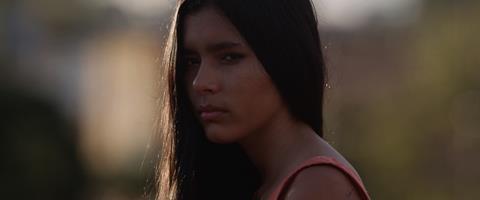Dir. Felipe Bragança. Brazil/Netherlands/France, 2016, 106 mins

The dusty residue of history clings to the hearts and minds of a younger generation in Don’t Swallow My Heart Alligator Girl, a wildly ambitious first solo feature from writer/director Felipe Bragança. The initial suggestion of a contemporary twist on Romeo And Juliet gives way to a much more wide-ranging tale but the mixture of magic realist fable, gang warfare, political history lesson and impossible love story never quite hangs together. There are enough flashes of inspiration and memorable moments to ensure festival attention but there is also a lingering sense that Bragança has bitten off more than he can comfortably chew.
This is a well crafted and often stylish film which might have had a greater impact with more room for the individual elements to breathe.
The title alone is enough to spark interest in Don’t Swallow My Heart, a film set along the border between Brazil and Paraguay and steeped in the long history of conflict between the two countries. Every part of the landscape serves as a reminder of the past; swords are retrieved from the river and bodies are seen floating past on the currents.
The ghosts of old grievances are everywhere, lending the film something of an affinity with Apichatpong Weerasethakul’s Cemetery Of Splendour. Now Brazilian youngster Joca (Eduardo Macedo) is besotted with sullen, Paraguayan teenager Basano (Adeli Gonzales), the self-styled “Tattooed Queen Of The Apa River”. He is willing to cross any line, betray any loyalty, to prove his love for her.
Unfolding under chapter headings like “A Land Of Heartless Boys” and “Escape Of The Coward Cowboy”, the film has the feel of a vast, sprawling novel that has been squashed into the modest running time of a feature. Joca’s much older brother Fernando (Cauã Reymond) is also known as December in a marauding group of motorcyclists called the Calendar Gang. Their clashes with Paraguayan rivals and night rides along pitch-dark highways could be straight from an instalment of the Fast And Furious series or Nicolas Winding Refn’s Drive, an impression underlined by the throbbing electronic score.
The shift in focus from Joca to the more conventional travails of the older Fernando dilutes the impact of the teenage romance and the intensity of the film ebbs and flows depending on where Bragança directs our attention. There are some magical scenes when Bragança embraces the more mystical, fairytale elements of the story. Cinematographer Glauco Firpo emphasises the blue-tinted twilight sky for an encounter between Joca and Basano as fireflies dart through the air and promises are exchanged. The scene where Fernando confronts his long absent father by the side of the river is equally potent but adds to the impression of an uneven venture with standout moments.
Firpo’s cinematography takes every chance to emphasise the gothic mood of the film and there is bags of atmosphere in the misty mornings and brooding darkness. The sound design is equally admirable as it picks out the rustle of the wind in the trees or the twitter of birds. This is a well crafted and often stylish film but you suspect it could have had a greater impact with more room for the individual elements to breathe.
International sales: Mundial cristina_garza@mundialsales.com
Producers: Marina Meliande, Marcos Prado
Cinematography: Glauco Firpo
Screenplay: Felipe Bragança
Editor: Jon Kadosca
Prod des: Dina Salem Levy
Music: Baris Akardere
Main cast: Eduardo Macedo, Cauã Reymond, Adeli Gonzales,







![The Brightest SunScreen[Courtesy HKIFF]](https://d1nslcd7m2225b.cloudfront.net/Pictures/274x183/3/5/0/1448350_thebrightestsunscreencourtesyhkiff_312678.jpg)













![The Brightest SunScreen[Courtesy HKIFF]](https://d1nslcd7m2225b.cloudfront.net/Pictures/100x67/3/5/0/1448350_thebrightestsunscreencourtesyhkiff_312678.jpg)



No comments yet